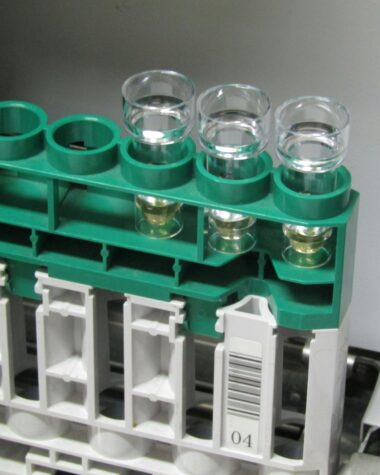Serina Therapeutics, Inc. (NYSE:SER) is a clinical-stage biotechnology company headquartered at the HudsonAlpha Institute of Biotechnology in Huntsville, Alabama. The company was founded with a clear mission: to transform the treatment landscape for neurological and other serious diseases by leveraging its proprietary POZ Platform™, a groundbreaking polymer-based drug delivery system. Unlike traditional biotech firms that focus solely on discovering new compounds, Serina’s innovation lies in re-engineering well-understood therapeutic agents into safer, longer-acting, and more effective treatments. This approach not only reduces the risk associated with unproven molecules but also positions the company to address urgent unmet needs across multiple therapeutic areas.
The foundation of Serina’s work is poly(2-oxazoline), a synthetic, water-soluble polymer designed to optimize how drugs are delivered in the body. This proprietary POZ technology allows for greater control over drug loading and precise release rates, addressing the key limitations of many existing therapies such as toxicity, poor tolerability, and short half-life. By creating long-acting injectables that maintain stable drug levels in the bloodstream, Serina is building a pipeline of next-generation therapies aimed at improving patient adherence, clinical outcomes, and quality of life.
Serina’s lead program, SER-252, is a POZ-apomorphine conjugate being developed for patients with advanced Parkinson’s disease, a condition that affects millions globally and still lacks optimal treatment options for late-stage management. This candidate is designed to reduce “off” episodes and improve motor function by providing more consistent dopamine stimulation through long-acting delivery. Complementing this effort is SER-270, a POZ-conjugated VMAT2 inhibitor in development for tardive dyskinesia, a disorder often caused by long-term antipsychotic use. The once-weekly injectable format of SER-270 has the potential to solve significant adherence challenges in institutional and outpatient care settings. Together, these candidates demonstrate how Serina is strategically applying its POZ Platform to neurological conditions where current therapies fall short.
Beyond its wholly owned pipeline, Serina has also validated its technology through industry partnerships. Most notably, the company entered into a non-exclusive license agreement with Pfizer, Inc., granting rights to apply the POZ polymer technology to lipid nanoparticle (LNP) drug delivery formulations. This collaboration underscores the broad applicability of Serina’s platform and creates a foundation for potential future partnerships, co-development projects, and licensing revenues across a wide spectrum of therapeutic areas.
Serina’s leadership team brings decades of expertise in neuroscience, drug development, and commercialization. The recent addition of Dr. Stephen Brannan, a veteran who helped lead Karuna Therapeutics’ clinical strategy for its groundbreaking KarXT program before the company’s $14 billion acquisition by Bristol Myers Squibb, highlights the caliber of talent driving Serina’s growth. Supported by experienced executives and strategic investors, the company is well-positioned to advance its programs from clinical trials through regulatory approval and market entry.
As it continues to build momentum, Serina has demonstrated financial discipline, securing funding from strategic shareholders and maintaining access to capital markets through its at-the-market offering program. With revenues supported by NIH grants, increasing R&D investment, and a focused pipeline, Serina is progressing rapidly toward pivotal clinical milestones that could redefine how debilitating neurological conditions are treated.
At its core, Serina Therapeutics represents a convergence of scientific innovation, clinical focus, and strategic execution. By applying its proprietary POZ Platform to some of the most challenging neurological diseases, the company is charting a path toward creating best-in-class therapies that have the potential to reshape standards of care. With multiple clinical programs on the horizon, strong leadership, and a validated technology platform, Serina stands out as an emerging biotech player with the vision and tools to deliver long-term value for both patients and investors.
Serina Therapeutics: A Rising Innovator in Neurological Drug Development
Serina Therapeutics, Inc. is quickly becoming one of the most closely watched small-cap biotech companies in the neurodegenerative space. Headquartered in Huntsville, Alabama, within the HudsonAlpha Institute of Biotechnology, Serina is a clinical-stage biotechnology company focused on developing long-acting therapies for neurological diseases and related conditions. What sets Serina apart from many of its biotech peers is its proprietary POZ Platform™, a breakthrough drug delivery technology based on poly(2-oxazoline), which is engineered to optimize pharmacokinetics, extend drug half-life, and minimize toxicity.
This unique platform technology positions Serina to solve one of the biggest limitations in drug development today: how to make already effective drugs safer, longer-lasting, and more convenient for patients. With an initial focus on Parkinson’s disease and tardive dyskinesia, Serina is targeting high unmet-need markets where improved long-acting injectables can transform patient care and adherence.

CHECK THIS OUT: Exact Sciences (EXAS) Just Made Cancer Detection 100x Easier! and Soleno Therapeutics (SLNO): The Biotech Company That Could Make You Rich.
Momentum Around SER-252 for Parkinson’s Disease
The company’s lead investigational candidate, SER-252, is a POZ-apomorphine conjugate designed for patients with advanced Parkinson’s disease. The program is on track to enter clinical trials in the fourth quarter of 2025 following favorable written feedback from the U.S. FDA earlier this year. Unlike traditional apomorphine treatments, which suffer from short half-life and difficult delivery mechanisms, SER-252 is designed as a long-acting injectable, potentially offering advanced Parkinson’s patients better control of “off” episodes, reduced dosing burden, and improved quality of life.
CEO Steve Ledger has emphasized that the entry of SER-252 into the clinic will serve as a proof point for how Serina’s POZ technology can deliver best-in-class treatment profiles. With Parkinson’s disease affecting more than 10 million people worldwide, including one million in the United States, the commercial potential of a differentiated long-acting injectable therapy is significant.
Expansion Into Tardive Dyskinesia with SER-270
In July 2025, Serina announced the advancement of SER-270, a POZ-conjugated VMAT2 inhibitor intended for tardive dyskinesia (TD). This once-weekly injectable therapy addresses a key challenge in TD management: poor adherence to oral regimens. SER-270 not only targets TD but may also be evaluated for Huntington’s disease chorea, an area with very limited long-acting injectable options.
The advancement of SER-270 illustrates Serina’s strategy of leveraging the POZ platform across multiple CNS indications where existing therapies suffer from pharmacokinetic challenges. By designing drugs that maintain stable and desirable levels in the bloodstream, Serina is positioning itself as a leader in creating patient-friendly, long-lasting treatments that address institutional care and compliance issues.
Strengthened Leadership with Proven Drug Development Expertise
In May 2025, Serina appointed Dr. Stephen (Steve) Brannan to its Board of Directors, a move that significantly strengthens its leadership bench. Dr. Brannan brings over three decades of neuroscience and neuropsychiatry drug development experience, having held leadership positions at Takeda, Novartis, Cyberonics (now LivaNova), and Eli Lilly. Most notably, he was Chief Medical Officer at Karuna Therapeutics, where he spearheaded the clinical strategy for KarXT (xanomeline-trospium)—the first new schizophrenia treatment in over 30 years. That success played a central role in Karuna’s $14 billion acquisition by Bristol Myers Squibb in 2024.
This appointment signals Serina’s serious intent to advance its pipeline from early-stage development through regulatory approval and eventual commercialization. It also reassures investors that the company is assembling a leadership team capable of scaling innovation into market-ready products.
Financial Updates: Strategic Funding and Prudent Cash Management
In April 2025, Serina raised $5 million from strategic shareholders to advance SER-252 into the clinic. This was complemented by an at-the-market (ATM) offering program with JonesTrading Institutional Services LLC, giving the company access to up to $13.3 million. As of August 2025, Serina had already raised $1.2 million through the ATM program.
For the second quarter of 2025, Serina reported revenues of $130,000, all derived from NIH grants, compared to $51,000 in the prior year. Operating expenses rose to $5.7 million, reflecting a natural increase in R&D spending as programs move closer to the clinic. R&D costs reached $3.2 million, up from $1.6 million in 2024, driven by consultant services, expanded headcount, and stock-based compensation. General and administrative expenses grew modestly to $2.5 million.
The company ended Q2 2025 with $6 million in cash and equivalents, projected to fund operations into Q4 2025. While near-term dilution risk remains a consideration, Serina’s ability to raise funds at favorable valuations underscores investor confidence in its clinical trajectory.
Proprietary POZ Platform™ as a Strategic Differentiator
The POZ Platform™ is the backbone of Serina’s innovation strategy. Based on a synthetic, water-soluble polymer called poly(2-oxazoline), the platform provides greater control in drug loading and precision in release rates. This makes it particularly suitable for small molecules and drugs with narrow therapeutic windows.
Unlike conventional drug delivery systems, POZ allows Serina to take already well-understood therapies and re-engineer them into long-acting formulations that maintain stable levels in the bloodstream while minimizing side effects. The potential applications extend well beyond neurology, and Serina has already demonstrated its willingness to out-license the platform through a non-exclusive licensing deal with Pfizer, which is using the POZ polymer technology in lipid nanoparticle (LNP) delivery formulations.
This partnership not only validates the POZ platform scientifically but also highlights the potential for future co-development and licensing revenue streams.
Outlook: A Compelling Speculative Growth Story
While Serina remains in the clinical-stage category and thus carries the inherent risks of trial outcomes and financing, the bullish case is clear. The company has a strong scientific foundation, an expanding pipeline in high-value CNS markets, and growing institutional credibility. Analysts covering the stock have placed median price targets near $13 per share, implying over 130% upside from current trading levels around $5.
With catalysts such as the initiation of Phase 1 trials for SER-252, advancement of SER-270, and potential future licensing deals for its POZ platform, Serina offers investors multiple shots on goal. The combination of innovative technology, seasoned leadership, and near-term clinical milestones makes Serina Therapeutics one of the most compelling small-cap biotech stories to watch heading into 2026.
READ ALSO: Johnson & Johnson (JNJ) can be the Next Trillion-Dollar Stock and Boston Scientific (BSX) Just Signed a $45M Deal—Here’s What It Means for Investors.








